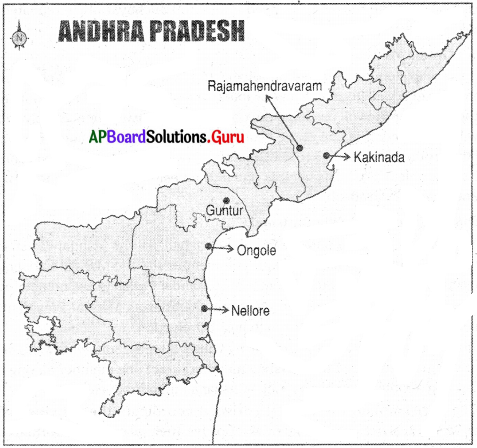These AP 6th Class Social Important Questions 10th Lesson Local Self-Government will help students prepare well for the exams.
AP State Syllabus 6th Class Social Important Questions 10th Lesson Local Self-Government
Question 1.
From what sources does the Panchayat receive funds?
Answer:
The Panchayat receives funds from these sources:
- Collection of taxes on houses, marketplaces, etc.
- Government scheme funds are received through various departments of the government – through the Janapad and Zilla Panchayats.
- Donations for community works etc.
Question 2.
What various works does a Gram Panchayat do?
Answer:
A Gram Panchayat does various works. These works include:
- The construction and maintenance of water sources, roads, drainage, school buildings, and other common property resources.
- Levying and collecting local taxes.
- Executing government schemes related to generating employment in the village.
![]()
Question 3.
Describe the functions of the Gram Sabha.
Answer:
The Gram Sabha performs various tasks :
- It keeps control of the Gram Panchayat. It makes the Gram Panchayat play its role and be responsible.
- It is the place where all plans for the work of the Gram Panchayat are placed before the people.
- The Gram Sabha prevents the Panchayat from doing wrong things which may include misusing funds or favoring certain people.
Question 4.
What is BLO?
Answer:
Booth Level Officer.
Question 5.
What is the duty of the booth level officer?
Answer:
The Booth level officer visits every house to check whether there are any changes in the voter’s list.
Question 6.
What is a ward? Explain in detail.
Answer:
A village is usually divided into a few ‘wards’ in such a way that all the wards have an almost an equal number of voters. Each ward elects one member to the village panchayat, called ‘Ward Member’. This ensures that people from all localities of the. village are represented. A person who attains 21 years of age or above can contest the election.
Question 7.
Write about the reservations in Gram Panchayats.
Answer:
Earlier it was difficult for women to get elected as ward members or a sarpanch. There is no representation for women even though they are 50% of the population. In parliament, it was decided that at least 1/3rd of all panchayat ward members and sarpanches will be reserved for them. Only women have to contest for those seats. In our state reservation to women extended to 50%.
Similarly, reservations are provided for SC/ST/BCs also. Panchayats function as a representative institutions of all people in the rural areas.
![]()
Question 8.
Write about elections to the panchayat.
Answer:
Elections to Gram Panchayats take place once in every five years. During these elections, every voter casts two votes- one to elect the ward member and another to elect the sarpanch. The person who gets the maximum votes is declared elected.
Question 9.
Write about sarpanch.
Answer:
The sarpanch is the head of the Gram Panchayat. He implements all the decisions of Panchayat. He looks day to day working of Panchayat. He is also responsible for the income and expenditure of the Panchayat.
Question 10.
Who is upa-sarpanch?
Answer:
Sarpanch and ward members elect one of the ward members as the deputy or upa- sarpanch through the indirect election. The upa-sarpanch acts in the absence of the sarpanch.
Question 11.
Write about Grama Sachivaiayam?
Answer:
Grama Sachivaiayam was started on October 2nd, 2019 in Andhra Pradesh. The main aim of Grama Sachivaiayam is to provide government services to the public effectively, transparently, and with accountability. There will be 11 employees of all sections. They will know the problems of the village and solve them immediately. It is a good move of the Government because the villagers need not go to the Panchayat office repeatedly to get the problem solved.
![]()
Question 12.
Write about Grama Volunteer.
Answer:
The grama Volunteer system was started on August 15th, 2019. One Grama Volunteer will be appointed for every 50 houses. If any problem in government services comes to the notice of the volunteer, he will report to the Grama Sachivaiayam immediately and the problem will get solved. It is one of the best services of the government. The person who faces the problem need not go to the Grama Sachivaiayam Office. Grama volunteer will solve the problem. So, 1 can say it is one of the best organisations started by the Government of Andhra Pradesh.
Question 13.
Briefly explain Mandal and Zilla Parishad.
Answer:
20-40 grama panchayats come under a Mandal Parishad. All the Mandal Parishads in the district come under the Zilla Parishad. The members of the Mandal Parishad are elected directly by the voters. Some members of Mandal Parishad are nominated.
The members of Mandal Parishad elect one member as Mandal President and another member as Vice President through the indirect election.
The Zilla Parishad members are elected by voters directly. Some members of Zilla Parishad are nominated. The Zilla Parishad members elect one member among them as Chairman and another member as Vice – Chairman in the indirect election.
The Zilla Parishad and the Mandal Parishad coordinate the activities of the Panchayats in the district and the Mandal, approve their plans, and coordinate the allocation of funds.
Question 14.
How many kinds of Municipal bodies are there? What are they?
Answer:
There are 3 kinds of Municipal bodies. They are classified according to the population.
- Nagar Panchayat: It consists of a 20,000 to 40,000 population.
- Municipal Council: It consists of 40,000 to 3,00,000 population.
- Municipal Corporation: It consists of more than 3,00,000 people.
![]()
Question 15.
Explain Nagar Panchayat.
Answer:
Nagar Panchayat has a committee consisting of a Chairman and Ward Councillors. Membership consists of a minimum of ten elected ward members and three nominated members. The Councillors or Ward members are chosen in the direct election from wards and their term is 5 years.
Question 16.
Write about Municipal Council.
Answer:
Each Municipality has Municipal Council with elected members who are known as “Councillors” and nominated members. The area of the Municipality is divided into wards and divisions. The Ward Councillors are elected directly every five years. These Councillors and the other members of the council together choose the Municipal Chairman indirectly.
Question 17.
Locate the following municipalities in Andhra Pradesh.
- Rajamahendravaram
- Kakinada
- Guntur
- Ongole
- Nellore
Answer:

Question 18.
Write about Municipal Corporation.
Answer:
Municipal Corporation consists of elected members known as “Corporators” and nominated members. The area of Municipal Corporation is divided into wards and divisions. The Ward Corporators are elected directly every five years. These Corporators and the other nominated members of the corporation together choose the Mayor of the Municipal Corporation indirectly.
Question 19.
How do the urban local bodies work?
Answer:
The Municipalities have a lot of tasks to perform. Besides Councillors or Corporators, these municipalities employ a large number of workers, officers, clerks, and accountants. Each Municipality has a number of departments each headed by an officer who is responsible for that department. Councilors or Corporators keep in touch with the people of the ward and understand their needs and problems and discuss them in municipal meetings.
![]()
Question 20.
What is the oldest municipality in Andhra Pradesh?
Answer:
Bheemunipatnam was the oldest municipality in Andhra Pradesh. It was established in 1861.
Question 21.
Write the main aims of the Grama Sachivalayam system and Grama Volunteers.
Answer:
The main aim of Grama Sachivalayam is to provide government services to the public effectively, transparently, and with accountability.
The main aim of Grama Volunteer is to deliver government services at the doorstep of all eligible households irrespective of caste/creed/religion/gender and political affiliation.
Question 22.
Mention the names of the functionaries in Grama Sachivalayam.
Answer:
There are 11 village secretariat functionaries in each Grama Sachivalayam.
They are:
- Panchayat Secretary (Convenor/DDO).
- VRO (Village Revenue Officer).
- Survey Assistant.
- ANM (Auxiliary Nurse and Midwife)
- Veterinary/Fisheries.
- Mahila Police and Women & Child Welfare Assistant
- Engineering Assistant.
- Energy Assistant.
- Agriculture/Horticulture MPEOs.
- Digital Assistant.
- Welfare and Education Assistant.
![]()
Question 23.
Visit any nearby Grama Sachivalayam. Observe the work of Village Secretariat Functionaries. Numbers are assigned to different village secretariat functionaries. Write the duties of the functionaries in their respective boxes.

Answer:
- Panchayat Secretary collects taxes, arranges Panchayat meetings, coordinates all the employees in village secretariat, responsible for total sanitation. Co-ordinate panchayat and village secretariat.
- Village Revenue Officer (VRO): Administrative / Revenue Duties, Police functions, Community and development.
- Village Surveyor: Survey officer for all purposes in a survey-related matter and maintain survey registers, instruments.
- Nurse (ANM): Mother and child care. Educates women on Health issues. Looks about vaccination and helps the medical officer.
- Animal Husbandry Assistant / Fisheries: Veterinary services / Animal Nutrition. Advise farmers in enhancing income.
- Energy Assistant: Power connections to the poor. Power supply problems, street lights / Maintenance of transformers.
- Engineering Assistant: Basic level performing technical officer. Roads/tanks / Drainage / Water supply and other engineering work.
- Malila Police and Women & Child Welfare Assistant: Mahila Police duties, women and children care, protection and welfare programmes, counseling sessions.
- Agriculture / Horticulture MPEOS: Monitor Agricultural activities, Monitor weather forecast, Agricultural production.
- Digital Assistant: Monitors the village in a single-window system.
- Welfare and Education Assistants: For SW/Tribal Welfare / BC welfare, pensions, insurance / Educational activities.
![]()
Question 24.
Read the paragraph under the heading ‘Grama Sachivalayam’ and comment on it.
The system of Grama Sachivalayam was started on October 2nd, 2019 in our state. One Grama Sachivalayam is established per2000people. There are 11 Village Secretariat Functionaries (employees) in every Grama Sachivalayam. The main aim of grama sachivalayam is to provide government services to the public effectively, transparently, and with accountability.
Answer:
Grama Sachivalayam was started on October 2nd, 2019 in Andhra Pradesh. Main aim of Grama Sachivalayam is to provide government services to the public effectively, transparently, and with accountability. Grama Sachivalayam was started on 2nd October 2019. There will be 11 employees of all sections. They will know the problems of the village if any and they will solve the problem immediately It is a good move of the Government because the villagers need not go to the Panchayat office repeatedly to get the problem solved.
Question 25.
Read the paragraph and comment on it.
The system of Grama Volunteers was started on August 15th, 2019 in our state. One Grama Volunteer is appointed per every 50 households. The duty of Grama Volunteer is to identify the problems being faced by anybody in his jurisdiction and bring them to the notice of Grama Panchayat and then get them resolved. The main aim of deploying Grama Volunteer is for delivering government services at the doorstep of all eligible households irrespective of caste/ creed/ religion and gender.
Answer:
The grama Volunteer system was started on August 15th, 2019. One grama volunteer will be appointed for every 50 houses. If any problem in government services comes to the notice of the volunteer, he will report to the Grama Sachivalayam immediately and the problem will get solved. It is one of the best services of the government. The person who faces the problem need not go to the grama sachivalayam office. The problem will get solved. So, I can say it is one of the best organizations started by the Government of Andhra Pradesh.